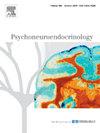Examination of positive states of mind and heart rate variability: Stress appraisals as a mechanism in trauma-exposed adults
IF 3.6
2区 医学
Q2 ENDOCRINOLOGY & METABOLISM
引用次数: 0
Abstract
While interest in the potentially salutary effects of positive well-being on cardiovascular health is increasing, we know relatively little about how positive states of mind affect cognitive and cardiovascular responses to stress in trauma survivors. We conducted a laboratory-based study with 84 adult trauma survivors to test the following hypotheses: (1) Greater positive states of mind will be associated with higher challenge appraisal, lower threat appraisal, and higher heart rate variability (HRV), controlling for posttraumatic stress symptom (PTSS) severity; (2) higher challenge appraisal and lower threat appraisal will mediate the association between greater positive states of mind and higher HRV, controlling for PTSS severity and body mass index (BMI). We conducted mediation analyses with 95 % confidence intervals and 5000 bootstrap samples to test threat and challenge appraisals as mediators of the relationships of positive states of mind with HRV responses to stress. Stronger appraisal of challenge mediated the effects of more positive states of mind on lower LF (nu) during recovery, controlling for PTSS and BMI. Threat appraisal was not a significant mediator of any association between positive states of mind and HRV reactivity or recovery. Our findings suggest that challenge appraisal may explain the association between greater positive states of mind and lower sympathetic arousal during recovery.
积极心态和心率变异性的检查:应激评估作为创伤暴露成人的一种机制
虽然人们对积极健康对心血管健康的潜在有益影响越来越感兴趣,但我们对积极心态如何影响创伤幸存者对压力的认知和心血管反应所知相对较少。我们对84名成年创伤幸存者进行了实验室研究,以验证以下假设:(1)在控制创伤后应激症状(PTSS)严重程度的情况下,较高的积极心态与较高的挑战评估、较低的威胁评估和较高的心率变异性(HRV)相关;(2)高挑战评价和低威胁评价会调节高积极心理状态与高HRV之间的关联,控制ptsd严重程度和体重指数(BMI)。我们以95% %的置信区间和5000个自举样本进行了中介分析,以检验威胁和挑战评估作为积极心态与HRV应激反应之间关系的中介。更强的挑战评价介导了更积极的心理状态对恢复期间低LF (nu)的影响,控制了PTSS和BMI。威胁评估在积极心理状态与HRV反应性或恢复之间没有显著的中介作用。我们的研究结果表明,挑战评估可以解释在恢复过程中更积极的心态和更低的交感神经觉醒之间的联系。
本文章由计算机程序翻译,如有差异,请以英文原文为准。
求助全文
约1分钟内获得全文
求助全文
来源期刊

Psychoneuroendocrinology
医学-精神病学
CiteScore
7.40
自引率
8.10%
发文量
268
审稿时长
66 days
期刊介绍:
Psychoneuroendocrinology publishes papers dealing with the interrelated disciplines of psychology, neurobiology, endocrinology, immunology, neurology, and psychiatry, with an emphasis on multidisciplinary studies aiming at integrating these disciplines in terms of either basic research or clinical implications. One of the main goals is to understand how a variety of psychobiological factors interact in the expression of the stress response as it relates to the development and/or maintenance of neuropsychiatric illnesses.
 求助内容:
求助内容: 应助结果提醒方式:
应助结果提醒方式:


